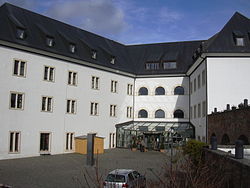Altleiningen Castle
| Altleiningen Castle | |
|---|---|
| Burg Altleiningen | |
| Altleiningen | |

Heart of the castle; now a youth hostel
|
|
| Coordinates | 49°30′41″N 8°04′58″E / 49.5114°N 8.0827°ECoordinates: 49°30′41″N 8°04′58″E / 49.5114°N 8.0827°E |
| Type | hill castle, spur castle |
| Code | DE-RP |
| Height | 400 m above sea level (NN) |
| Site information | |
| Condition | preserved or largely preserved |
| Site history | |
| Built | around 1100 to 1110 |
| Garrison information | |
| Occupants | counts |
Altleiningen is a castle in the Palatinate Forest in Germany. It lies in the parish of Altleiningen in the county of Bad Durkheim in the German state of Rhineland-Palatinate.
Whilst the parish of Altleiningen lies at 300 metres above sea level along the length of the valley of the Eckbach, the hill castle was built on the domed summit of a hill, about 400 metres high, that rises above the left bank of the Eckbach.
The name, like that of its sister castle, Neuleiningen 5 kilometres northeast, is derived from the Frankish noble family of Leiningen, who used to rule the territory of the Leiningerland.
The mighty hill fortress is built on rocks and was probably established around 1100 to 1110 by the Count of Leiningen, Emich I, and his son, Emich II, under the name of Leiningen Castle. The overall castle site, which follows the shape of the hilltop, has a triangular ground plan. Of the original caste, only a few wall remains on the west side have survived. The outer ward was surrounded by its own moat and by a main ditch hewn out of the rock, over which there was a drawbridge that separated it from the actual castle. Two kilometres to the south of the castle, Emich II founded Höningen Abbey around 1120.
During the peasants' uprising in 1525 the castle suffered its first destruction. The present site is based on its rebuilding in the Renaissance style, beginning in 1528, by counts Cuno II, Philip I, Louis and John Casimir. Its reconstruction required the local farmers to render socage.
...
Wikipedia

